2201NRS Assignment 1: Clinical Decision Making in Nursing Practice
VerifiedAdded on 2022/08/12
|8
|1637
|42
Essay
AI Summary
This essay delves into the benefits of clinical decision-making for nurses, emphasizing its contextual and evolving nature, crucial for effective patient care. The paper examines factors influencing clinical decision-making, using the author's experience in an orthopaedic ward to illustrate the application of the 'hypothetico-deductive reasoning' theory, teamwork, and situation awareness. It also explores the role of Health Information Technology, specifically Electronic Health Records (EHRs), in improving patient care, highlighting both advantages such as reduced errors and efficient data retrieval, and disadvantages like potential workflow disruptions and privacy concerns. The essay concludes by underscoring the importance of clinical decision-making and EHRs in modern healthcare while acknowledging areas needing improvement for enhanced patient safety and data security. The author provides a detailed analysis of how EHRs have automated workflow, delivered digitalized documents to patients, and enhanced communication among medical professionals.
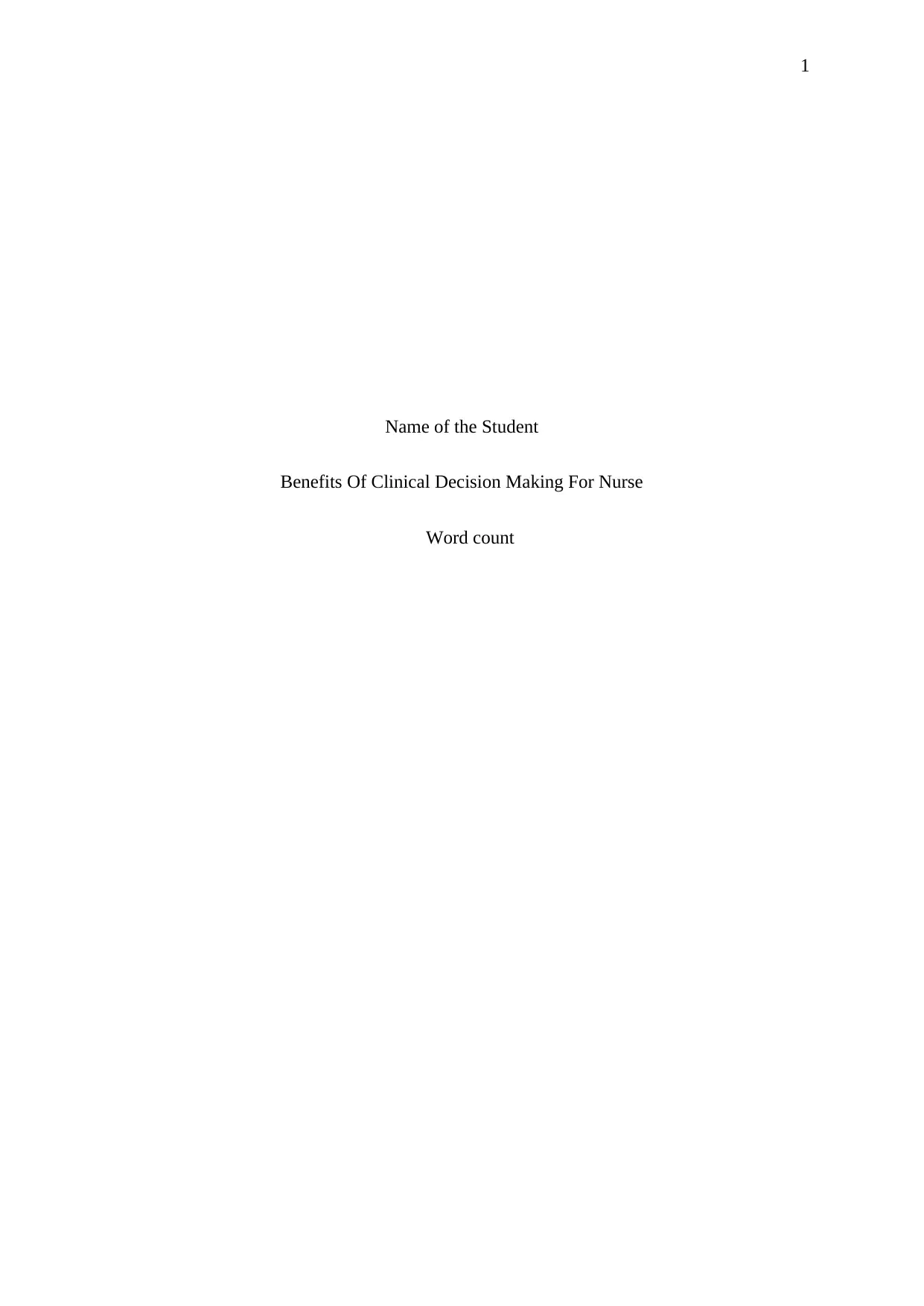
1
Name of the Student
Benefits Of Clinical Decision Making For Nurse
Word count
Name of the Student
Benefits Of Clinical Decision Making For Nurse
Word count
Paraphrase This Document
Need a fresh take? Get an instant paraphrase of this document with our AI Paraphraser
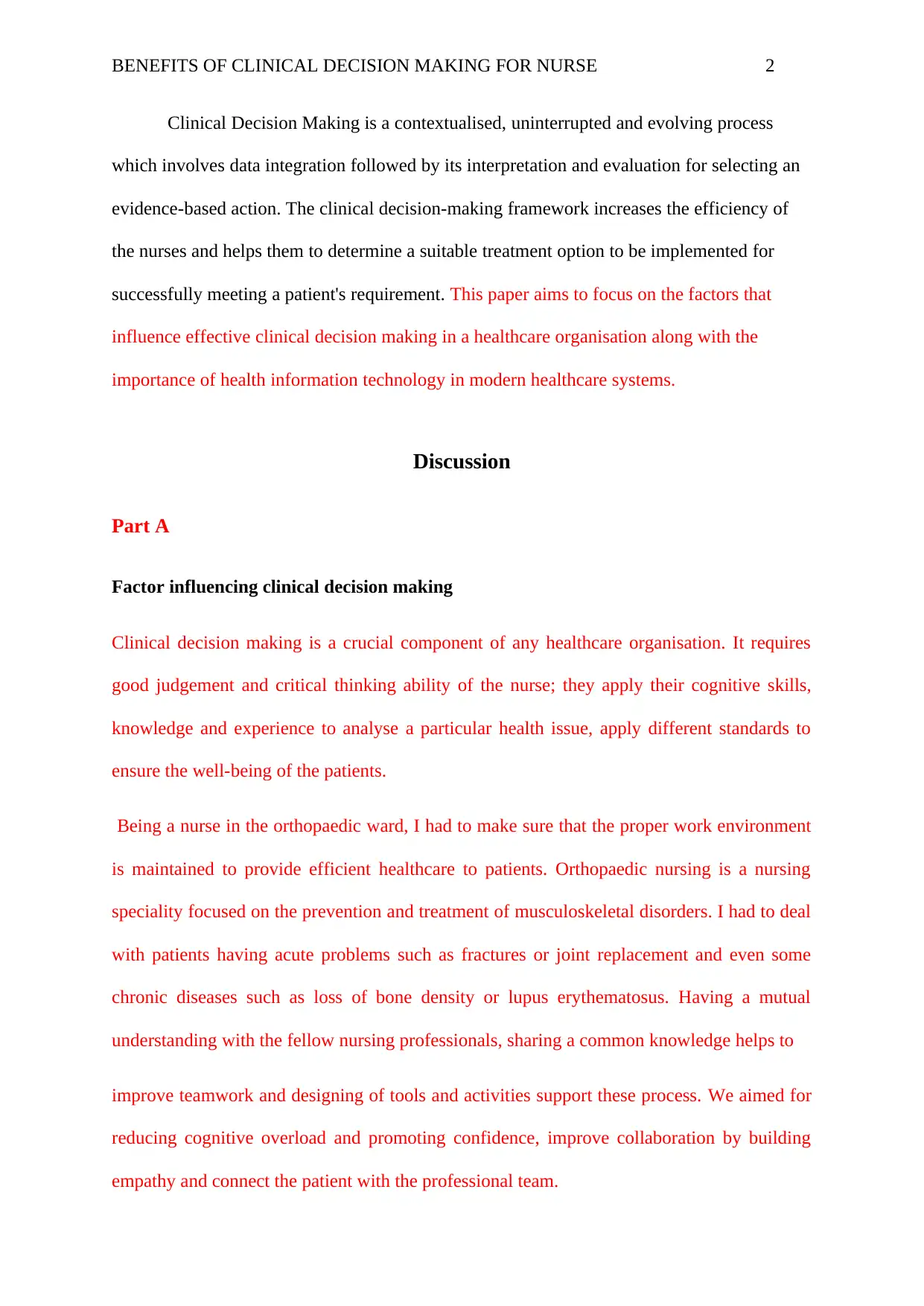
BENEFITS OF CLINICAL DECISION MAKING FOR NURSE 2
Clinical Decision Making is a contextualised, uninterrupted and evolving process
which involves data integration followed by its interpretation and evaluation for selecting an
evidence-based action. The clinical decision-making framework increases the efficiency of
the nurses and helps them to determine a suitable treatment option to be implemented for
successfully meeting a patient's requirement. This paper aims to focus on the factors that
influence effective clinical decision making in a healthcare organisation along with the
importance of health information technology in modern healthcare systems.
Discussion
Part A
Factor influencing clinical decision making
Clinical decision making is a crucial component of any healthcare organisation. It requires
good judgement and critical thinking ability of the nurse; they apply their cognitive skills,
knowledge and experience to analyse a particular health issue, apply different standards to
ensure the well-being of the patients.
Being a nurse in the orthopaedic ward, I had to make sure that the proper work environment
is maintained to provide efficient healthcare to patients. Orthopaedic nursing is a nursing
speciality focused on the prevention and treatment of musculoskeletal disorders. I had to deal
with patients having acute problems such as fractures or joint replacement and even some
chronic diseases such as loss of bone density or lupus erythematosus. Having a mutual
understanding with the fellow nursing professionals, sharing a common knowledge helps to
improve teamwork and designing of tools and activities support these process. We aimed for
reducing cognitive overload and promoting confidence, improve collaboration by building
empathy and connect the patient with the professional team.
Clinical Decision Making is a contextualised, uninterrupted and evolving process
which involves data integration followed by its interpretation and evaluation for selecting an
evidence-based action. The clinical decision-making framework increases the efficiency of
the nurses and helps them to determine a suitable treatment option to be implemented for
successfully meeting a patient's requirement. This paper aims to focus on the factors that
influence effective clinical decision making in a healthcare organisation along with the
importance of health information technology in modern healthcare systems.
Discussion
Part A
Factor influencing clinical decision making
Clinical decision making is a crucial component of any healthcare organisation. It requires
good judgement and critical thinking ability of the nurse; they apply their cognitive skills,
knowledge and experience to analyse a particular health issue, apply different standards to
ensure the well-being of the patients.
Being a nurse in the orthopaedic ward, I had to make sure that the proper work environment
is maintained to provide efficient healthcare to patients. Orthopaedic nursing is a nursing
speciality focused on the prevention and treatment of musculoskeletal disorders. I had to deal
with patients having acute problems such as fractures or joint replacement and even some
chronic diseases such as loss of bone density or lupus erythematosus. Having a mutual
understanding with the fellow nursing professionals, sharing a common knowledge helps to
improve teamwork and designing of tools and activities support these process. We aimed for
reducing cognitive overload and promoting confidence, improve collaboration by building
empathy and connect the patient with the professional team.
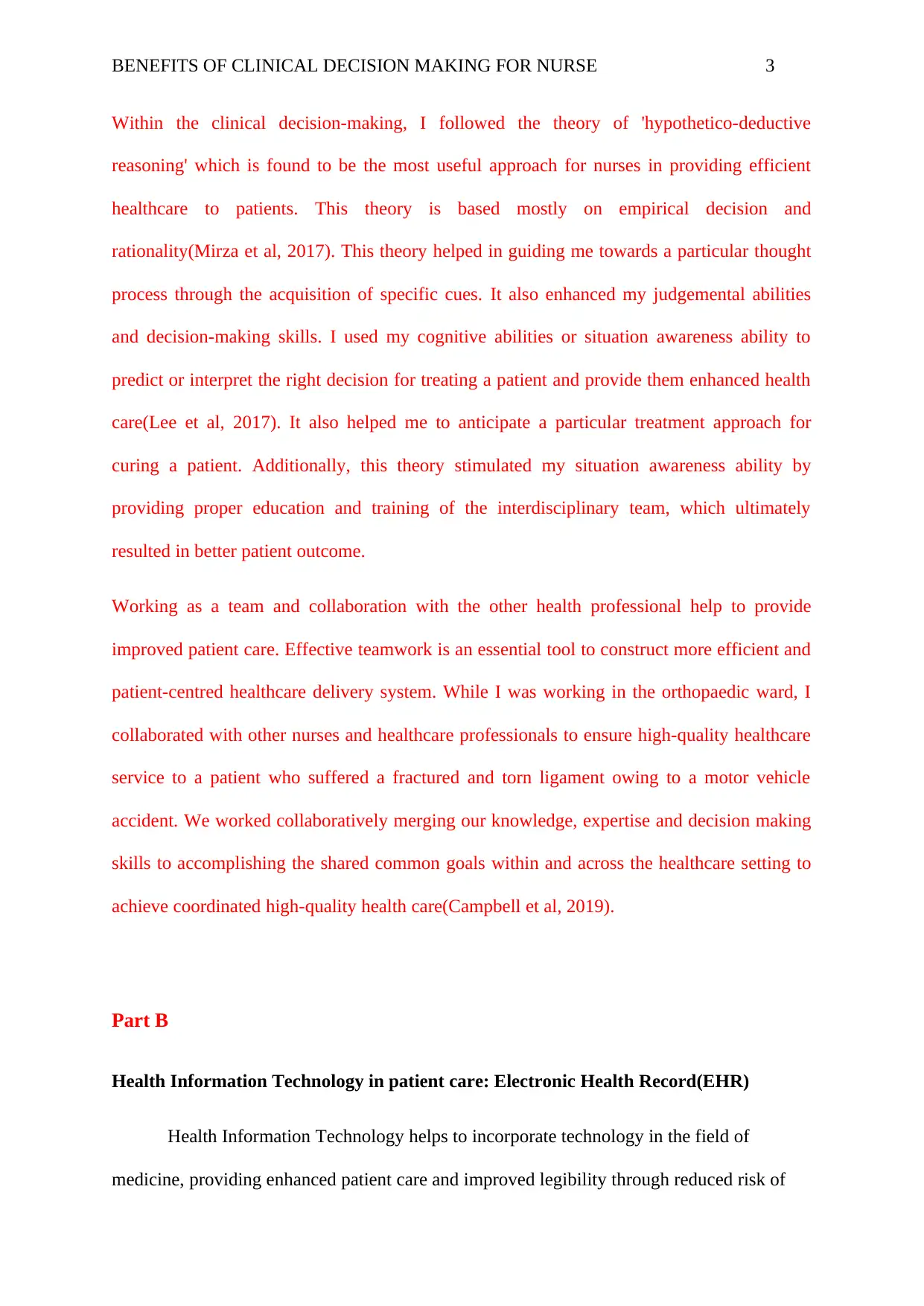
BENEFITS OF CLINICAL DECISION MAKING FOR NURSE 3
Within the clinical decision-making, I followed the theory of 'hypothetico-deductive
reasoning' which is found to be the most useful approach for nurses in providing efficient
healthcare to patients. This theory is based mostly on empirical decision and
rationality(Mirza et al, 2017). This theory helped in guiding me towards a particular thought
process through the acquisition of specific cues. It also enhanced my judgemental abilities
and decision-making skills. I used my cognitive abilities or situation awareness ability to
predict or interpret the right decision for treating a patient and provide them enhanced health
care(Lee et al, 2017). It also helped me to anticipate a particular treatment approach for
curing a patient. Additionally, this theory stimulated my situation awareness ability by
providing proper education and training of the interdisciplinary team, which ultimately
resulted in better patient outcome.
Working as a team and collaboration with the other health professional help to provide
improved patient care. Effective teamwork is an essential tool to construct more efficient and
patient-centred healthcare delivery system. While I was working in the orthopaedic ward, I
collaborated with other nurses and healthcare professionals to ensure high-quality healthcare
service to a patient who suffered a fractured and torn ligament owing to a motor vehicle
accident. We worked collaboratively merging our knowledge, expertise and decision making
skills to accomplishing the shared common goals within and across the healthcare setting to
achieve coordinated high-quality health care(Campbell et al, 2019).
Part B
Health Information Technology in patient care: Electronic Health Record(EHR)
Health Information Technology helps to incorporate technology in the field of
medicine, providing enhanced patient care and improved legibility through reduced risk of
Within the clinical decision-making, I followed the theory of 'hypothetico-deductive
reasoning' which is found to be the most useful approach for nurses in providing efficient
healthcare to patients. This theory is based mostly on empirical decision and
rationality(Mirza et al, 2017). This theory helped in guiding me towards a particular thought
process through the acquisition of specific cues. It also enhanced my judgemental abilities
and decision-making skills. I used my cognitive abilities or situation awareness ability to
predict or interpret the right decision for treating a patient and provide them enhanced health
care(Lee et al, 2017). It also helped me to anticipate a particular treatment approach for
curing a patient. Additionally, this theory stimulated my situation awareness ability by
providing proper education and training of the interdisciplinary team, which ultimately
resulted in better patient outcome.
Working as a team and collaboration with the other health professional help to provide
improved patient care. Effective teamwork is an essential tool to construct more efficient and
patient-centred healthcare delivery system. While I was working in the orthopaedic ward, I
collaborated with other nurses and healthcare professionals to ensure high-quality healthcare
service to a patient who suffered a fractured and torn ligament owing to a motor vehicle
accident. We worked collaboratively merging our knowledge, expertise and decision making
skills to accomplishing the shared common goals within and across the healthcare setting to
achieve coordinated high-quality health care(Campbell et al, 2019).
Part B
Health Information Technology in patient care: Electronic Health Record(EHR)
Health Information Technology helps to incorporate technology in the field of
medicine, providing enhanced patient care and improved legibility through reduced risk of
⊘ This is a preview!⊘
Do you want full access?
Subscribe today to unlock all pages.

Trusted by 1+ million students worldwide
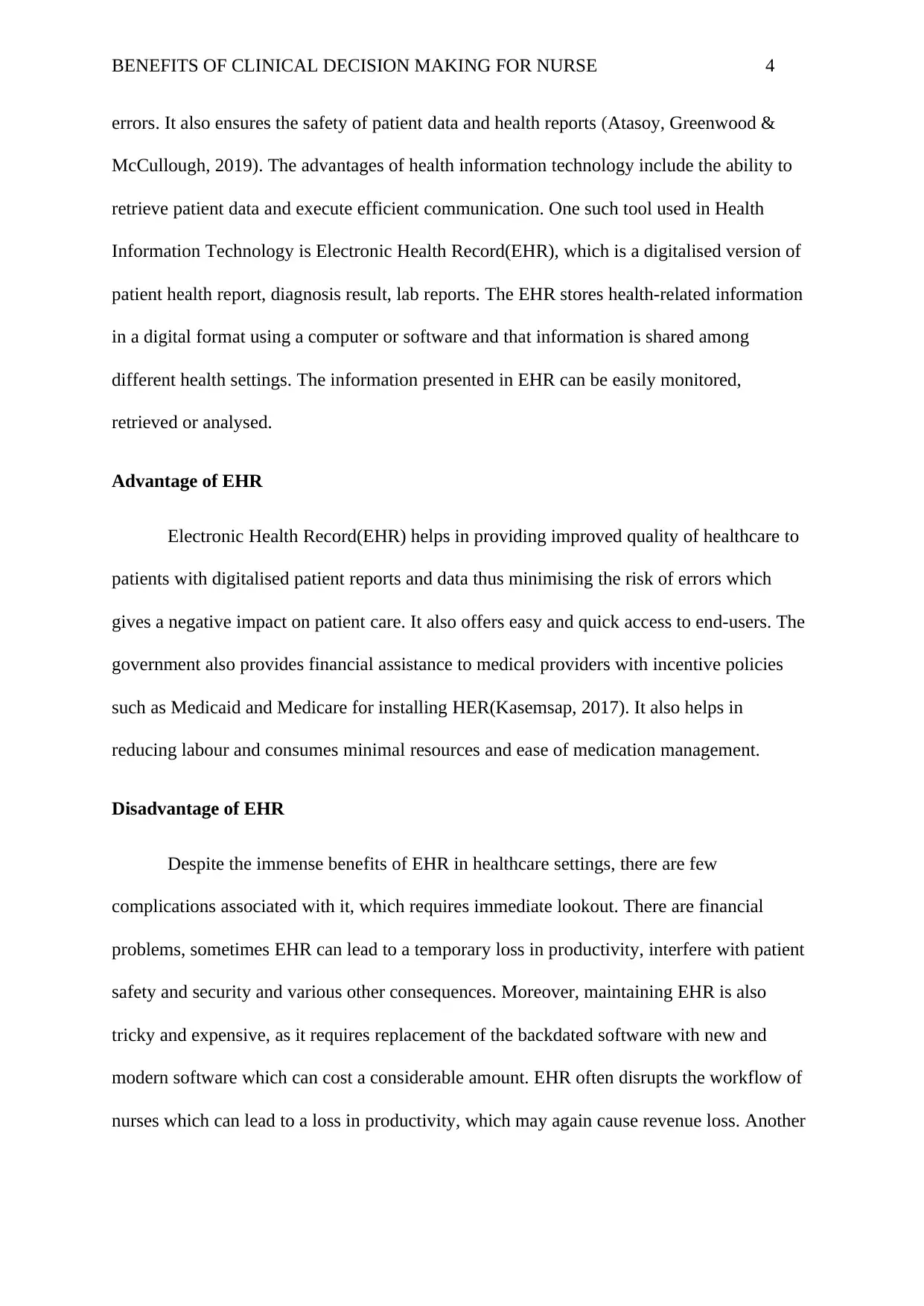
BENEFITS OF CLINICAL DECISION MAKING FOR NURSE 4
errors. It also ensures the safety of patient data and health reports (Atasoy, Greenwood &
McCullough, 2019). The advantages of health information technology include the ability to
retrieve patient data and execute efficient communication. One such tool used in Health
Information Technology is Electronic Health Record(EHR), which is a digitalised version of
patient health report, diagnosis result, lab reports. The EHR stores health-related information
in a digital format using a computer or software and that information is shared among
different health settings. The information presented in EHR can be easily monitored,
retrieved or analysed.
Advantage of EHR
Electronic Health Record(EHR) helps in providing improved quality of healthcare to
patients with digitalised patient reports and data thus minimising the risk of errors which
gives a negative impact on patient care. It also offers easy and quick access to end-users. The
government also provides financial assistance to medical providers with incentive policies
such as Medicaid and Medicare for installing HER(Kasemsap, 2017). It also helps in
reducing labour and consumes minimal resources and ease of medication management.
Disadvantage of EHR
Despite the immense benefits of EHR in healthcare settings, there are few
complications associated with it, which requires immediate lookout. There are financial
problems, sometimes EHR can lead to a temporary loss in productivity, interfere with patient
safety and security and various other consequences. Moreover, maintaining EHR is also
tricky and expensive, as it requires replacement of the backdated software with new and
modern software which can cost a considerable amount. EHR often disrupts the workflow of
nurses which can lead to a loss in productivity, which may again cause revenue loss. Another
errors. It also ensures the safety of patient data and health reports (Atasoy, Greenwood &
McCullough, 2019). The advantages of health information technology include the ability to
retrieve patient data and execute efficient communication. One such tool used in Health
Information Technology is Electronic Health Record(EHR), which is a digitalised version of
patient health report, diagnosis result, lab reports. The EHR stores health-related information
in a digital format using a computer or software and that information is shared among
different health settings. The information presented in EHR can be easily monitored,
retrieved or analysed.
Advantage of EHR
Electronic Health Record(EHR) helps in providing improved quality of healthcare to
patients with digitalised patient reports and data thus minimising the risk of errors which
gives a negative impact on patient care. It also offers easy and quick access to end-users. The
government also provides financial assistance to medical providers with incentive policies
such as Medicaid and Medicare for installing HER(Kasemsap, 2017). It also helps in
reducing labour and consumes minimal resources and ease of medication management.
Disadvantage of EHR
Despite the immense benefits of EHR in healthcare settings, there are few
complications associated with it, which requires immediate lookout. There are financial
problems, sometimes EHR can lead to a temporary loss in productivity, interfere with patient
safety and security and various other consequences. Moreover, maintaining EHR is also
tricky and expensive, as it requires replacement of the backdated software with new and
modern software which can cost a considerable amount. EHR often disrupts the workflow of
nurses which can lead to a loss in productivity, which may again cause revenue loss. Another
Paraphrase This Document
Need a fresh take? Get an instant paraphrase of this document with our AI Paraphraser
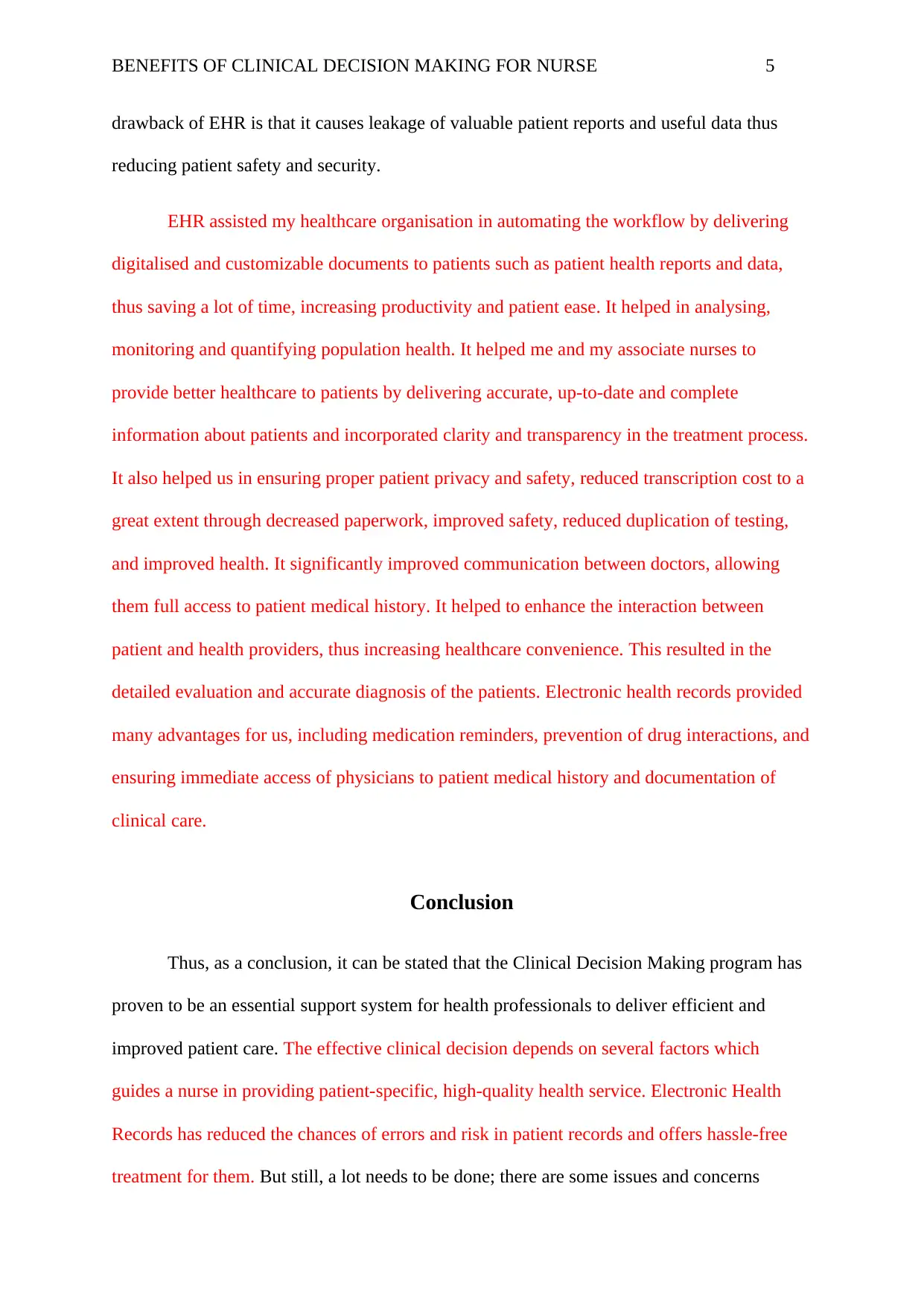
BENEFITS OF CLINICAL DECISION MAKING FOR NURSE 5
drawback of EHR is that it causes leakage of valuable patient reports and useful data thus
reducing patient safety and security.
EHR assisted my healthcare organisation in automating the workflow by delivering
digitalised and customizable documents to patients such as patient health reports and data,
thus saving a lot of time, increasing productivity and patient ease. It helped in analysing,
monitoring and quantifying population health. It helped me and my associate nurses to
provide better healthcare to patients by delivering accurate, up-to-date and complete
information about patients and incorporated clarity and transparency in the treatment process.
It also helped us in ensuring proper patient privacy and safety, reduced transcription cost to a
great extent through decreased paperwork, improved safety, reduced duplication of testing,
and improved health. It significantly improved communication between doctors, allowing
them full access to patient medical history. It helped to enhance the interaction between
patient and health providers, thus increasing healthcare convenience. This resulted in the
detailed evaluation and accurate diagnosis of the patients. Electronic health records provided
many advantages for us, including medication reminders, prevention of drug interactions, and
ensuring immediate access of physicians to patient medical history and documentation of
clinical care.
Conclusion
Thus, as a conclusion, it can be stated that the Clinical Decision Making program has
proven to be an essential support system for health professionals to deliver efficient and
improved patient care. The effective clinical decision depends on several factors which
guides a nurse in providing patient-specific, high-quality health service. Electronic Health
Records has reduced the chances of errors and risk in patient records and offers hassle-free
treatment for them. But still, a lot needs to be done; there are some issues and concerns
drawback of EHR is that it causes leakage of valuable patient reports and useful data thus
reducing patient safety and security.
EHR assisted my healthcare organisation in automating the workflow by delivering
digitalised and customizable documents to patients such as patient health reports and data,
thus saving a lot of time, increasing productivity and patient ease. It helped in analysing,
monitoring and quantifying population health. It helped me and my associate nurses to
provide better healthcare to patients by delivering accurate, up-to-date and complete
information about patients and incorporated clarity and transparency in the treatment process.
It also helped us in ensuring proper patient privacy and safety, reduced transcription cost to a
great extent through decreased paperwork, improved safety, reduced duplication of testing,
and improved health. It significantly improved communication between doctors, allowing
them full access to patient medical history. It helped to enhance the interaction between
patient and health providers, thus increasing healthcare convenience. This resulted in the
detailed evaluation and accurate diagnosis of the patients. Electronic health records provided
many advantages for us, including medication reminders, prevention of drug interactions, and
ensuring immediate access of physicians to patient medical history and documentation of
clinical care.
Conclusion
Thus, as a conclusion, it can be stated that the Clinical Decision Making program has
proven to be an essential support system for health professionals to deliver efficient and
improved patient care. The effective clinical decision depends on several factors which
guides a nurse in providing patient-specific, high-quality health service. Electronic Health
Records has reduced the chances of errors and risk in patient records and offers hassle-free
treatment for them. But still, a lot needs to be done; there are some issues and concerns
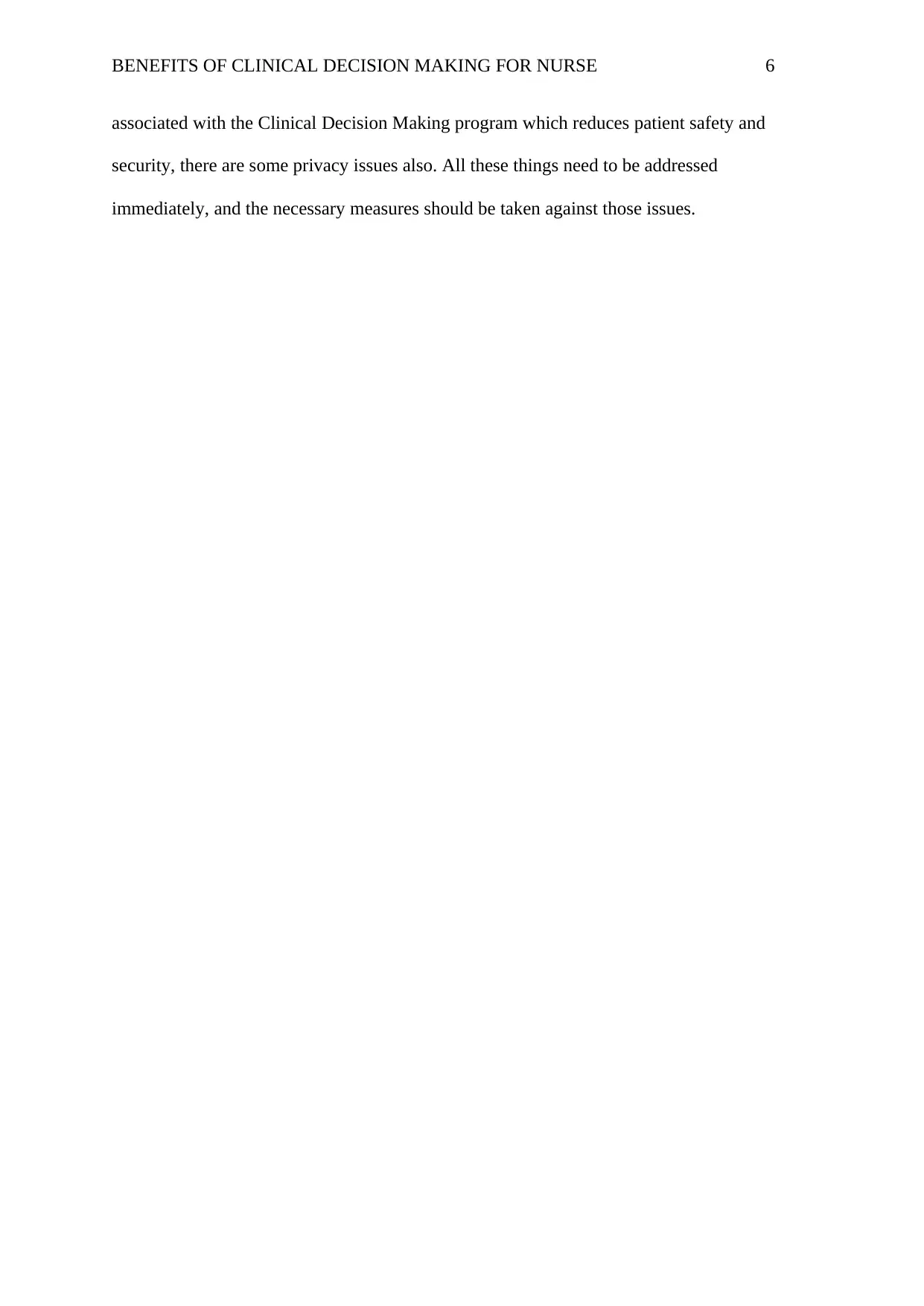
BENEFITS OF CLINICAL DECISION MAKING FOR NURSE 6
associated with the Clinical Decision Making program which reduces patient safety and
security, there are some privacy issues also. All these things need to be addressed
immediately, and the necessary measures should be taken against those issues.
associated with the Clinical Decision Making program which reduces patient safety and
security, there are some privacy issues also. All these things need to be addressed
immediately, and the necessary measures should be taken against those issues.
⊘ This is a preview!⊘
Do you want full access?
Subscribe today to unlock all pages.

Trusted by 1+ million students worldwide
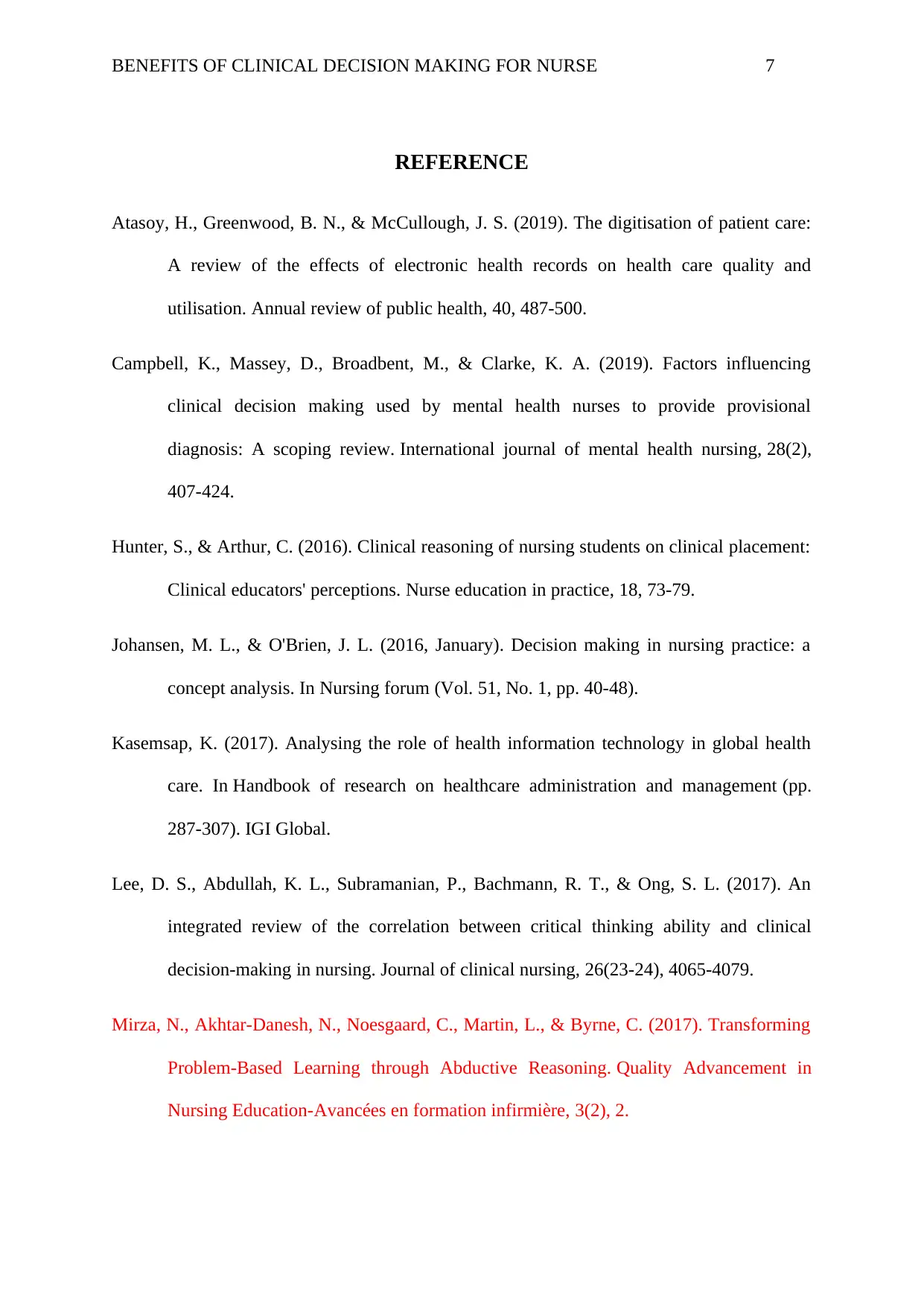
BENEFITS OF CLINICAL DECISION MAKING FOR NURSE 7
REFERENCE
Atasoy, H., Greenwood, B. N., & McCullough, J. S. (2019). The digitisation of patient care:
A review of the effects of electronic health records on health care quality and
utilisation. Annual review of public health, 40, 487-500.
Campbell, K., Massey, D., Broadbent, M., & Clarke, K. A. (2019). Factors influencing
clinical decision making used by mental health nurses to provide provisional
diagnosis: A scoping review. International journal of mental health nursing, 28(2),
407-424.
Hunter, S., & Arthur, C. (2016). Clinical reasoning of nursing students on clinical placement:
Clinical educators' perceptions. Nurse education in practice, 18, 73-79.
Johansen, M. L., & O'Brien, J. L. (2016, January). Decision making in nursing practice: a
concept analysis. In Nursing forum (Vol. 51, No. 1, pp. 40-48).
Kasemsap, K. (2017). Analysing the role of health information technology in global health
care. In Handbook of research on healthcare administration and management (pp.
287-307). IGI Global.
Lee, D. S., Abdullah, K. L., Subramanian, P., Bachmann, R. T., & Ong, S. L. (2017). An
integrated review of the correlation between critical thinking ability and clinical
decision‐making in nursing. Journal of clinical nursing, 26(23-24), 4065-4079.
Mirza, N., Akhtar-Danesh, N., Noesgaard, C., Martin, L., & Byrne, C. (2017). Transforming
Problem-Based Learning through Abductive Reasoning. Quality Advancement in
Nursing Education-Avancées en formation infirmière, 3(2), 2.
REFERENCE
Atasoy, H., Greenwood, B. N., & McCullough, J. S. (2019). The digitisation of patient care:
A review of the effects of electronic health records on health care quality and
utilisation. Annual review of public health, 40, 487-500.
Campbell, K., Massey, D., Broadbent, M., & Clarke, K. A. (2019). Factors influencing
clinical decision making used by mental health nurses to provide provisional
diagnosis: A scoping review. International journal of mental health nursing, 28(2),
407-424.
Hunter, S., & Arthur, C. (2016). Clinical reasoning of nursing students on clinical placement:
Clinical educators' perceptions. Nurse education in practice, 18, 73-79.
Johansen, M. L., & O'Brien, J. L. (2016, January). Decision making in nursing practice: a
concept analysis. In Nursing forum (Vol. 51, No. 1, pp. 40-48).
Kasemsap, K. (2017). Analysing the role of health information technology in global health
care. In Handbook of research on healthcare administration and management (pp.
287-307). IGI Global.
Lee, D. S., Abdullah, K. L., Subramanian, P., Bachmann, R. T., & Ong, S. L. (2017). An
integrated review of the correlation between critical thinking ability and clinical
decision‐making in nursing. Journal of clinical nursing, 26(23-24), 4065-4079.
Mirza, N., Akhtar-Danesh, N., Noesgaard, C., Martin, L., & Byrne, C. (2017). Transforming
Problem-Based Learning through Abductive Reasoning. Quality Advancement in
Nursing Education-Avancées en formation infirmière, 3(2), 2.
Paraphrase This Document
Need a fresh take? Get an instant paraphrase of this document with our AI Paraphraser
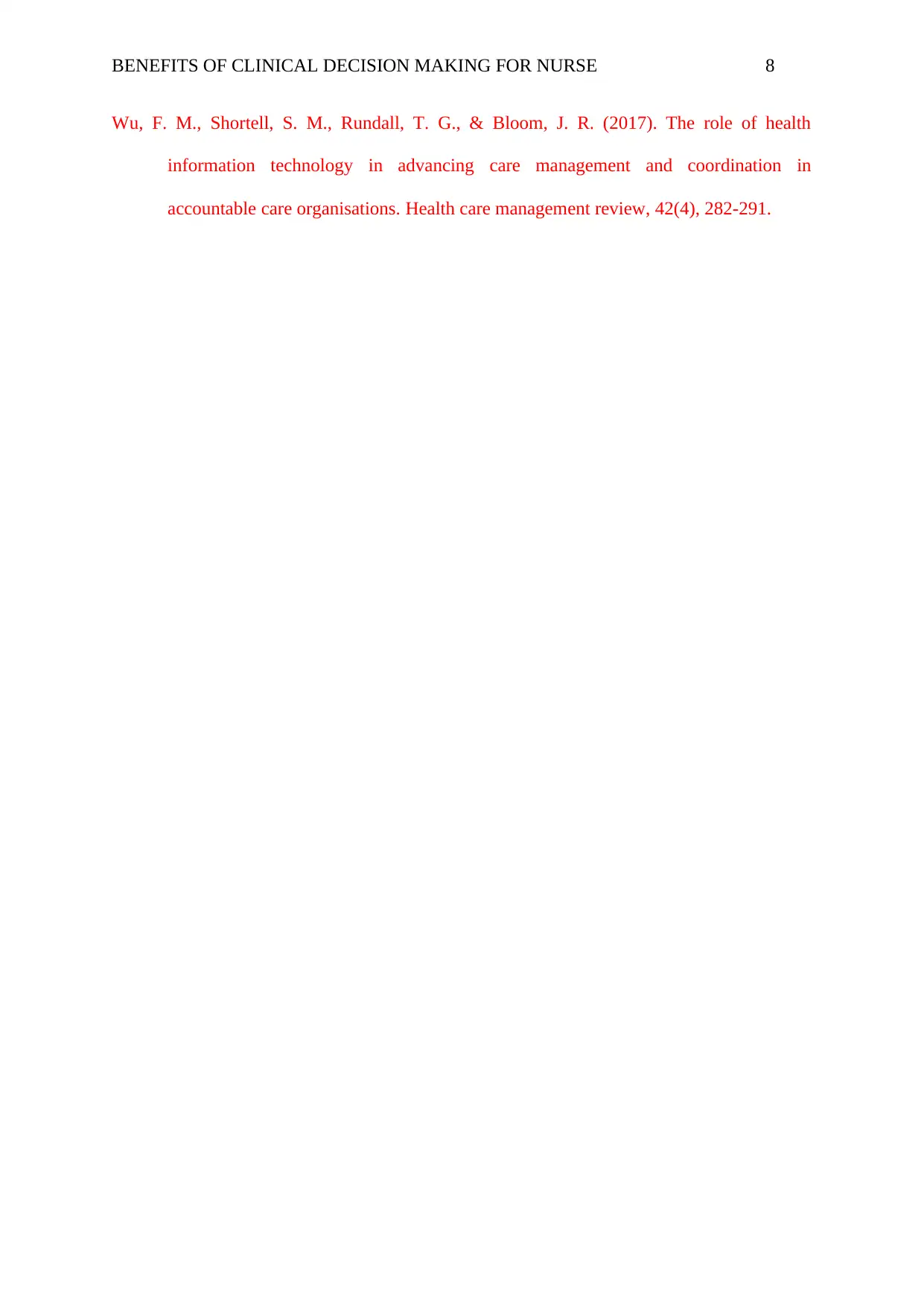
BENEFITS OF CLINICAL DECISION MAKING FOR NURSE 8
Wu, F. M., Shortell, S. M., Rundall, T. G., & Bloom, J. R. (2017). The role of health
information technology in advancing care management and coordination in
accountable care organisations. Health care management review, 42(4), 282-291.
Wu, F. M., Shortell, S. M., Rundall, T. G., & Bloom, J. R. (2017). The role of health
information technology in advancing care management and coordination in
accountable care organisations. Health care management review, 42(4), 282-291.
1 out of 8
Related Documents
Your All-in-One AI-Powered Toolkit for Academic Success.
+13062052269
info@desklib.com
Available 24*7 on WhatsApp / Email
![[object Object]](/_next/static/media/star-bottom.7253800d.svg)
Unlock your academic potential
Copyright © 2020–2026 A2Z Services. All Rights Reserved. Developed and managed by ZUCOL.





